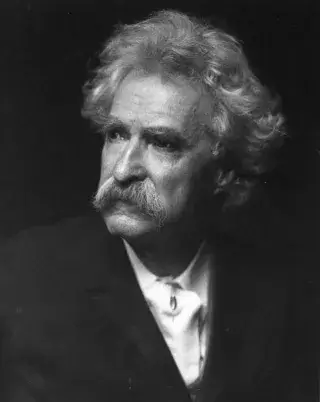Biography of Mark Twain

| date | place | |
|---|---|---|
| born | November 30, 1835 | Florida, Missouri |
| died | April 21, 1910 | Redding, Connecticut |
Mark Twain, born Samuel Langhorne Clemens in Florida, Missouri, was an iconic American writer, humorist, entrepreneur, publisher, and lecturer whose contributions to literature and cultural commentary continue to resonate worldwide. Twain spent his formative years in Hannibal, Missouri, a bustling town along the banks of the Mississippi River. This setting would profoundly influence his writing, providing the backdrop for many of his most beloved works, including "The Adventures of Tom Sawyer" and its sequel, "Adventures of Huckleberry Finn." Twain's childhood was marked by both adventure and hardship. He lost his father at a young age and was raised primarily by his mother and older siblings. Despite financial struggles, he received a rudimentary education, which he supplemented with voracious reading and a keen observance of the world around him. At the age of 11, Twain's father's death prompted him to leave school and seek employment to support his family. He worked as a printer's apprentice and later as a typesetter, developing a passion for writing and journalism. Twain's early experiences as a printer and journalist laid the foundation for his future literary career, shaping his distinctive voice and perspective on American society. In his late teens, Twain fulfilled a lifelong dream by becoming a steamboat pilot on the Mississippi River, a profession he pursued with enthusiasm and skill. The years spent navigating the river provided him with a wealth of material and inspiration for his writing, as well as earning him the nickname Mark Twain, derived from the riverboat term indicating a safe depth for navigation. However, the outbreak of the Civil War disrupted Twain's career as a riverboat pilot, leading him to briefly join a Confederate militia before ultimately deciding to move westward to avoid further involvement in the conflict. He traveled extensively throughout the western United States, working as a miner, journalist, and lecturer, all the while honing his craft as a writer and humorist. Twain's literary career began to take off in the late 1860s with the publication of his first major work, "The Celebrated Jumping Frog of Calaveras County," a humorous short story that brought him widespread acclaim. This early success propelled him into the literary spotlight and laid the groundwork for a prolific writing career that would span decades. Throughout his life, Twain remained a prolific writer, producing a diverse body of work that encompassed novels, short stories, essays, and travelogues. His writing style was characterized by wit, humor, and keen observation, earning him a reputation as one of America's greatest satirists and social commentators. Twain's most enduring works, including "The Adventures of Tom Sawyer" and "Adventures of Huckleberry Finn," are considered masterpieces of American literature, celebrated for their vivid characters, rich storytelling, and incisive commentary on issues such as race, identity, and morality. Despite facing controversy and censorship, particularly in relation to the portrayal of race in his writing, Twain's works have endured as timeless classics that continue to captivate readers of all ages. Beyond his literary accomplishments, Twain was also a shrewd entrepreneur and businessman. He invested in various ventures, including publishing and technology, although not all of his endeavors proved successful. One notable failure was his investment in the Paige Compositor, an early typesetting machine, which ultimately cost him a significant portion of his fortune. Despite financial setbacks and personal tragedies, including the deaths of his wife and several of his children, Twain remained resilient and continued to write prolifically until his death. He also embarked on lecture tours both in the United States and abroad, earning him international acclaim and solidifying his reputation as a cultural icon. Mark Twain passed away on April 21, 1910, leaving behind a rich literary legacy that continues to inspire and entertain readers around the world. His enduring wit, wisdom, and insight into the human condition ensure that his works remain as relevant and thought-provoking today as they were during his lifetime. Twain's contributions to American literature and culture are indelible, cementing his status as one of the most beloved and influential writers in history.

Feel free to be first to leave comment.